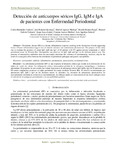
Please use this identifier to cite or link to this item:
http://ricaxcan.uaz.edu.mx/jspui/handle/20.500.11845/828Full metadata record
| DC Field | Value | Language |
|---|---|---|
| dc.contributor | 121534 | es_ES |
| dc.contributor.other | https://orcid.org/0000-0002-1513-4971 | - |
| dc.contributor.other | 0000-0002-1513-4971 | - |
| dc.coverage.spatial | Global | es_ES |
| dc.creator | Bermúdez Jiménez, Carlos | - |
| dc.creator | Romero Quintana, José | - |
| dc.creator | Aguilar Medinar, Maribel | - |
| dc.creator | Ramos Payan, Rosalío | - |
| dc.creator | Galván Valencia, Marisol | - |
| dc.creator | Ayala Luján, Jorge | - |
| dc.creator | Aceves Medina, María del Carmen | - |
| dc.creator | Aguilera Galaviz, Luis Alejandro | - |
| dc.date.accessioned | 2019-03-22T16:09:25Z | - |
| dc.date.available | 2019-03-22T16:09:25Z | - |
| dc.date.issued | 2016-08 | - |
| dc.identifier | info:eu-repo/semantics/publishedVersion | es_ES |
| dc.identifier.issn | 2334-2501 | es_ES |
| dc.identifier.uri | http://localhost/xmlui/handle/20.500.11845/828 | - |
| dc.identifier.uri | https://doi.org/10.48779/bpry-s012 | - |
| dc.description | Periodontal disease (PD) is a chronic inflammatory response resulting in the destruction of tooth-supporting tissues. Chronic inflammation triggers loss of immune tolerance and autoimmune phenomenon. The purpose of this study was to evaluate the presence of serum IgG, IgM and IgA of 18 patients with PD against protein components of rabbit periodontal tissue by Western Blot. Recognition was observed for IgG, IgM and IgA in the different patient sera. The presence of autoreactive antibodies does not necessarily determine the existence of autoimmunity, however, may be the result of a synergistic effect between the stimulation of periodontal pathogens and genetic susceptibility. | es_ES |
| dc.description.abstract | La enfermedad periodontal (EP) es una respuesta inflamatoria crónica que resulta en la destrucción de los tejidos de sostén del diente. La inflamación crónica desencadena pérdida de la tolerancia inmunológica y fenómeno autoinmune. El propósito de este estudio fue evaluar la presencia de anticuerpos séricos IgG, IgM e IgA de 18 pacientes con EP contra componentes proteicos de tejido periodontal de conejo mediante Western Blot. Se observó reconocimiento por anticuerpos IgG, IgM e IgA en los distintos sueros de pacientes. La presencia de anticuerpos autorreactivos no necesariamente determina la existencia de autoinmunidad, sin embargo puede ser consecuencia de un efecto sinérgico entre el estímulo de los patógenos periodontales y la susceptibilidad genética. | es_ES |
| dc.language.iso | spa | es_ES |
| dc.publisher | Editorial Iberoamericana de Ciencias | es_ES |
| dc.relation | http://www.reibci.org/publicados/2016/ago/1700105.pdf | es_ES |
| dc.relation.uri | generalPublic | es_ES |
| dc.rights | Atribución-NoComercial-CompartirIgual 3.0 Estados Unidos de América | * |
| dc.rights.uri | http://creativecommons.org/licenses/by-nc-sa/3.0/us/ | * |
| dc.source | Revista Iberoamericana de Ciencias Vol. 3, No.4, pp. 59-67 | es_ES |
| dc.subject.classification | MEDICINA Y CIENCIAS DE LA SALUD [3] | es_ES |
| dc.subject.other | periodontitis | es_ES |
| dc.subject.other | antibody | es_ES |
| dc.subject.other | inflammation | es_ES |
| dc.subject.other | autoimmunity | es_ES |
| dc.subject.other | autoreactivity | es_ES |
| dc.subject.other | periodontal tissue | es_ES |
| dc.subject.other | periodontitis | es_ES |
| dc.subject.other | anticuerpo | es_ES |
| dc.subject.other | inflamación | es_ES |
| dc.subject.other | autoinmunidad | es_ES |
| dc.subject.other | autorreactividad | es_ES |
| dc.subject.other | tejido periodontal | es_ES |
| dc.title | Detección de anticuerpos séricos IgG, IgM e IgA de pacientes con Enfermedad Periodontal | es_ES |
| dc.type | info:eu-repo/semantics/article | es_ES |
| Appears in Collections: | *Documentos Académicos*-- UA Odontología | |
Files in This Item:
| File | Description | Size | Format | |
|---|---|---|---|---|
| C Artículo DETECCION DE IgG IgM IgA.pdf | 265,49 kB | Adobe PDF |  View/Open |
This item is licensed under a Creative Commons License
